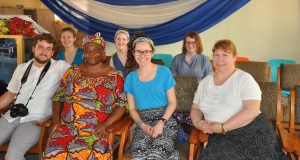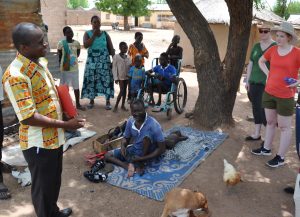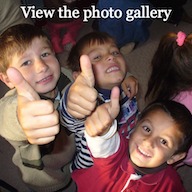
Darrell Gilkes(Front left) and the rest of our YIM team with our PCG Host, Esther, in traditional Ghanaian dress

Issac Tiiga (Left) Program Coordinator for the CBR Garu introduces the YIM team to one of the clients that are being helped through our PWS&D programs
In our own country of Canada, we often consider people with disabilities to be well taken care of. We have social programs, doctors, physiotherapists, and a myriad of various charities and government systems in place. We are thankful that we have such programs, but a question that had bothered me even before I had even made the decision to make this trip: What happens to people with disabilities in developing countries which don’t have the resources or systematic organization to have the programs that we do? One of my major goals for this trip was to find out an answer to that question.
On May 6, I finally got that question answered in Garu, Ghana at the Community Based Rehabilitation Centre, Garu (CBR). CBR, Garu is a project sponsored by Presbyterian World Service and Development (PWS&D) the relief and development arm of The Presbyterian Church in Canada. It focuses on supporting people with both physical and mental disabilities by giving them access to knowledge (such as learning how to earn a living), technologies (such as wheelchairs or hand bikes to move around), and assisting in the social aspects of being disabled. Going in, I was very skeptical of what their attitude of people with disabilities was going to be. As someone who is physically disabled myself (with Cerebral Palsy) I was worried as a disability advocate. But the Garu Rehabilitation Centre proved me wrong, as they view disability from a social perspective rather than a medical one. To break it down simply, they view disability as something which needs to be accommodated and integrated into society, instead of viewing it as something that needs to be “fixed” or “cured”. To me, it shows that the centre is impressively progressive in the things that they do.
Over the course of my time on the first day at the Garu Rehabilitation Centre I saw many of the participants in their respectful villages. I met a paralyzed man who tailored shoes for a living and was now happily married with a loving wife and kids. I met spinsters who wove fabrics that could only use their left side very well. I even met a woman who drove around in a hand-pedaled tricycle who now owned her own store which sold drinks, candies, and essentials much like your around-the-corner convenience store. The Rehabilitation Centre has been the key and gateway to these people’s lives. It put a smile on my face to know that people with disabilities could actually earn a modest income despite the harshness of their country.
The most important thing I took from my day’s experience was the fact that the Garu Rehabilitation Centre’s work has made people with disabilities accepted in their respective villages and towns without having any stigma towards them. The Centre itself works hard to go into the community where each person with a disability lives and teaches the community about the disability, and how they can help. This is something that not even we as Canadians do in our neighborhoods, and so in some ways the Ghanaians have better structured their disability programs than we do.
As a disabled advocate and as a member of The Presbyterian Church in Canada, I can tell you that so far the Garu Rehabilitation centre is something that exemplifies the qualities of compassion, understanding, and outreach into the community: all characteristics of what we as Presbyterians value and share throughout the world. I am very excited to continue learning more about the centre in my upcoming days, but I am certain already that I will find things that will show the love, compassion, and sharing that Christ himself showed with us. More to come once we have completed our time in Garu.
—-Darrell Gilkes


